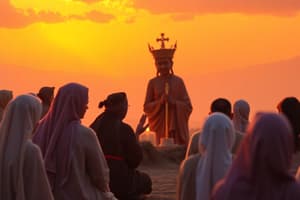Podcast
Questions and Answers
What does the Latin word 'religio' mean?
What does the Latin word 'religio' mean?
- To bind or yoke (correct)
- To fear nature
- To glorify a spirit
- To worship a deity
Which reason for practicing religion is associated with a desire to confront life's challenges?
Which reason for practicing religion is associated with a desire to confront life's challenges?
- Identity
- Fear (correct)
- Wonder
- Intuition
Which of the following is NOT one of the four elements of religion?
Which of the following is NOT one of the four elements of religion?
- Community
- Cult
- Code
- Charisma (correct)
What aspect of religion addresses the big questions of existence?
What aspect of religion addresses the big questions of existence?
Which of the following describes the 'Cult' element of religion?
Which of the following describes the 'Cult' element of religion?
Which reason for practicing religion emphasizes a sense of identity?
Which reason for practicing religion emphasizes a sense of identity?
Which element of religion consists of shared beliefs and fundamental principles?
Which element of religion consists of shared beliefs and fundamental principles?
The role of 'Intuition' in practicing religion typically involves which of the following?
The role of 'Intuition' in practicing religion typically involves which of the following?
Which role within a religion is primarily responsible for interpreting divine messages?
Which role within a religion is primarily responsible for interpreting divine messages?
Which of the following is NOT a tendency of all religions?
Which of the following is NOT a tendency of all religions?
What characteristic common in all religions provides a framework for moral behavior?
What characteristic common in all religions provides a framework for moral behavior?
Which term refers to a community of individuals dedicated to a religious lifestyle?
Which term refers to a community of individuals dedicated to a religious lifestyle?
Which characteristic is associated with the roles of founders and significant leaders in a religion?
Which characteristic is associated with the roles of founders and significant leaders in a religion?
Which of the following describes a common reason for religious division?
Which of the following describes a common reason for religious division?
What is the significance of having a system of codes of conduct in religion?
What is the significance of having a system of codes of conduct in religion?
Which of the following aspects serves to answer life’s pressing questions within religions?
Which of the following aspects serves to answer life’s pressing questions within religions?
What do Easter and Christmas symbolize in modern celebrations?
What do Easter and Christmas symbolize in modern celebrations?
What is a common reason for discrimination against individuals practicing their religion today?
What is a common reason for discrimination against individuals practicing their religion today?
What is the primary stance of fundamentalist groups regarding secularization?
What is the primary stance of fundamentalist groups regarding secularization?
Which of the following is an example of fundamentalism?
Which of the following is an example of fundamentalism?
How have secular phenomena impacted the celebration of Christmas?
How have secular phenomena impacted the celebration of Christmas?
What motivates the emergence of fundamentalist groups?
What motivates the emergence of fundamentalist groups?
Why are Easter and Christmas perceived as more secular now than in the past?
Why are Easter and Christmas perceived as more secular now than in the past?
Which is NOT a characteristic commonly associated with fundamentalist groups?
Which is NOT a characteristic commonly associated with fundamentalist groups?
What characterizes the belief system of authentic religions?
What characterizes the belief system of authentic religions?
What is a common feature of cults regarding their leaders?
What is a common feature of cults regarding their leaders?
How do cults typically approach the concept of family within their groups?
How do cults typically approach the concept of family within their groups?
What type of ethics do cults often impose on their members?
What type of ethics do cults often impose on their members?
What is a fundamental distinction between authentic religions and cults regarding leadership?
What is a fundamental distinction between authentic religions and cults regarding leadership?
What is a common psychological effect of cult participation on adherents?
What is a common psychological effect of cult participation on adherents?
Which of the following statements best describes the relationship between cults and their scriptures?
Which of the following statements best describes the relationship between cults and their scriptures?
How does the perception of outsiders differ between authentic religions and cults?
How does the perception of outsiders differ between authentic religions and cults?
What role does the preaching of a leader play in cults with apocalyptic beliefs?
What role does the preaching of a leader play in cults with apocalyptic beliefs?
What is a significant message emphasized in the Nostra Aetate document?
What is a significant message emphasized in the Nostra Aetate document?
Which term best describes a community where everyone is free to practice their own beliefs and are treated equally?
Which term best describes a community where everyone is free to practice their own beliefs and are treated equally?
What is one of the key benefits of living in a pluralistic society?
What is one of the key benefits of living in a pluralistic society?
What should individuals realize about those from different religious backgrounds, according to the document?
What should individuals realize about those from different religious backgrounds, according to the document?
Which of the following is NOT a recommended way to foster peace in a diverse community?
Which of the following is NOT a recommended way to foster peace in a diverse community?
What is the purpose of interreligious dialogue?
What is the purpose of interreligious dialogue?
According to the Nostra Aetate document, how does God relate to all people regardless of their faith?
According to the Nostra Aetate document, how does God relate to all people regardless of their faith?
Flashcards are hidden until you start studying
Study Notes
Understanding Religion
- Religion is defined as the service and adoration of God or gods, reflected in worship practices.
- Originates from the Latin word "religio," meaning awe or fear in the presence of a spirit or deity, as well as to bind or yoke.
Reasons for Practicing Religion
- Fear: Religion serves as a coping mechanism for life's fears, such as death and loneliness.
- Wonder: The beauty and complexity of nature evoke belief in a higher power beyond scientific explanation.
- Questioning: It arises from a quest for meaning and transcendence beyond birth and death.
- Identity: Religion helps individuals understand their beliefs, identity, and existence.
- Intuition: A search for deeper truths that go beyond material societal views.
- Big Questions: Religion provides guidance on profound questions about life and existence.
Elements of Religion (The 4 C’s)
- Creed: A shared system of beliefs that outlines concepts of the divine, humanity, and salvation.
- Code: Ethical guidelines and moral rules governing behavior (e.g., the Ten Commandments).
- Cult: Rituals and worship practices that describe how to honor the divine.
- Community: The social structure and identity of the religious group, defining relationships with others.
Roles in Religion
- Founder: A figure who establishes a new religious movement or tradition.
- Prophet: An individual who conveys divine messages and is often subject to persecution.
- Mystic: A seeker of an intimate experience with the divine.
- Priest: A community representative responsible for worship and rituals.
- Religious: Monks or nuns committed to a specific religious lifestyle.
- Reformer: A change agent who seeks to realign practices with original religious intentions.
- Theologian: A scholar focused on the study of religious faith and practices.
Common Characteristics of Religions
- Belief in a supernatural spiritual realm and the existence of a soul.
- Sacred scriptures and authoritative texts.
- Organized religious institutions (e.g., churches, synagogues).
- Community and familial bonds fostered through rituals and festivals.
- Answers to existential questions and guidance for moral conduct.
- Notable founders who inspire the faith.
- Aspirations for perfection and salvation.
- Commitment to a life of faith and worship.
Tendencies in Religion
- Fragmentation into different sects and groups.
- Shift from polytheism to monotheism in belief systems.
- Division and self-perpetuating nature often lead to exclusivity.
- Intellectual engagement balanced with emotional expression.
- Various forms of sacrifice and worship practices.
Differentiating Religion and Culture
- Religion encompasses beliefs and worship practices, while culture relates to traditions and origins.
- Avoiding stereotypes is essential as individuals can practice multiple religions irrespective of their cultural backgrounds.
Secularization of Religious Festivals
- Festivals like Easter and Christmas have seen secular adaptations (e.g., Santa Claus, Easter Bunny) overshadowing sacred observances.
- Many individuals celebrate these events with secular traditions rather than religious rituals.
Challenges Facing Religious Practitioners
- Harassment and derogatory remarks can emerge in environments like schools, impacting minority religious groups.
Fundamentalism
- Defined as a reactionary movement against secularism, often emerging from dissatisfaction with mainstream religious practices.
- Examples include ultra-Orthodox Jews and Evangelical Christians.
Characteristics of Fundamentalist Groups
- Belief in error-free sacred texts taken literally.
- Strong attachment to historical traditions and dogmas.
- Intolerance towards differing worldviews deemed heretical.
- Fixed moral and ethical frameworks.
- Strong leadership and often aggressive stances towards secularism.
Authentic Religions vs. Cults
- Authentic religions have a significant founder, a moral code, and promote community welfare.
- Cults focus on a charismatic leader, control adherents, isolate them, and often advocate for extreme beliefs or practices.
Nostra Aetate Document Significance
- Released by Pope John VI, it highlights similarities between Christianity and non-Christian religions, promoting acceptance and unity.
- Encourages an inclusive view of humanity based on shared beliefs and the divine.
Pluralism
- Refers to a community where diverse religions coexist respectfully.
- Benefits include community safety, reduced discrimination, and mutual respect.
- Recommendations for peaceful coexistence include accepting others, recognizing diversity, and understanding shared humanity.
Interreligious Dialogue
- A conversation between different religious traditions aimed at fostering understanding.
- Benefits include increased respect, reduced prejudice, and mutual enrichment.
- Suggests Catholics could take the lead in promoting such dialogues for better communal relationships.
Studying That Suits You
Use AI to generate personalized quizzes and flashcards to suit your learning preferences.




